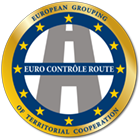ECR scrutinises social fraud.
On May 21st, Euro Contrôle Route organised a workshop held at the General Secretariat on the enforcement of cabotage rules in road transport.
The workshop was introduced by Deputy Secretary-General Alain de Muyser, who explained Benelux initiatives on social fraud and strengthening collaboration amongst the inspection authorities.

The cabotage legislation was adopted in order to make the transport chain more efficient and more ecological by allowing transport companies to undertake three transport operations in the seven days following an international transport within the country of final destination. In theory this reduces the number of trucks riding around empty on European roads.
Since the legislation was introduced, however, it has become clear that the cabotage rules are being widely trampled on and, in the worst cases, these abuses are being utilised as a cover for circumventing social legislation. Hired by mailbox companies, drivers from low-cost countries carry out ´so-called´ cabotage assignments in countries with a higher level of social protection, but in reality they operate there illegally for months on end.
These practices have seriously disrupted the internal market (unfair competition, social exploitation) and the long absence of the trucks from their home base means that they are often poorly maintained, with pernicious consequences for traffic safety.

Because this problem affects the entire transport chain, sufficient room was given to all stakeholders to elucidate their perspective. Speakers from the industry (IRU), drivers´ unions (ETF) and policy makers (EC DG-MOVE) drew a striking picture of the reality in the field.
In the afternoon best practices were shared by France and the United Kingdom. These diverse practices made it clear that cabotage is enforceable, but requires a significant investment in manpower and budget as well as coordination with the labour inspectorate.
A conclusion that was further confirmed in the group discussions that closed the programme.
29/05/2013 - 09:05
